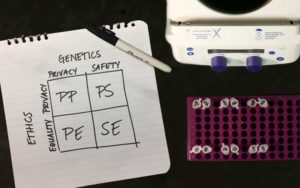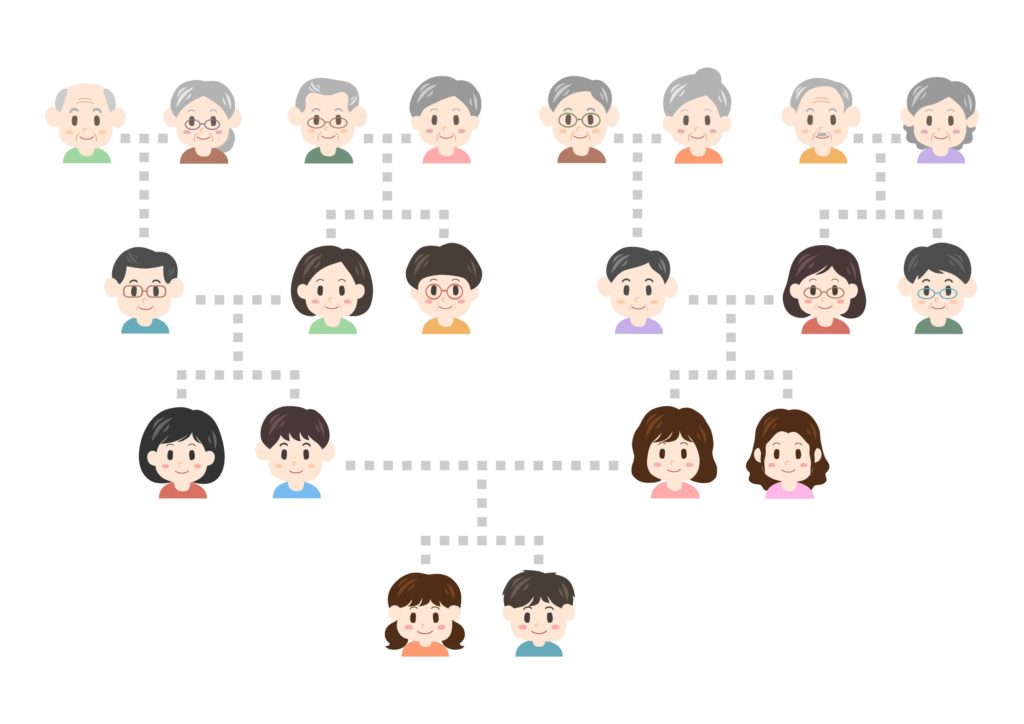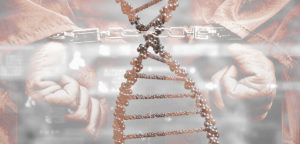 I majored in genetics because I love Punnett Squares. Don’t get me wrong, I was fascinated by the groundbreaking research going on in fields like oncology and agriculture, but there was something about the simple and logical nature of calculating inheritance patterns that really drew me in. At the time when I confusingly wandered into my advisor’s office to make this life changing academic decision, I had no idea that this degree would help me see the more complicated, “gray area”, of science, changing the way that I look at the world today.
I majored in genetics because I love Punnett Squares. Don’t get me wrong, I was fascinated by the groundbreaking research going on in fields like oncology and agriculture, but there was something about the simple and logical nature of calculating inheritance patterns that really drew me in. At the time when I confusingly wandered into my advisor’s office to make this life changing academic decision, I had no idea that this degree would help me see the more complicated, “gray area”, of science, changing the way that I look at the world today.
What is “GenEthics” ?
As I’m sure you’ve already guessed, “GenEthics” is the intersection between the fields of genetics and ethics. A broad term involving questions related to the implications of a variety of different topics in genetic research; “GenEthics” covers everything from the modification of stem cells, to gene therapy and GMOs. Since this term encompasses such a large array of topics, I’m going to focus on some of the ethical questions related to your genome.
Genomic data and its applications
If you’ve ever heard of 23andMe or Ancestry.com then you’ve already had an introduction to genomic data. These direct-to-consumer genetic testing companies are a result of advancements in technology that have made the genotyping process relatively cheap and quick. When you submit a sample, they send it to a lab, extract the DNA, and test it for various markers. What’s returned to you is a report of what markers (alleles) you do and don’t have. These reports can tell you everything from what percent German you are, to your status for any of the many alleles of several genes that may increase risk for Alzheimer’s disease. Genomic data has affected a variety of fields; knowledge of the genome has allowed us to catch famous criminals like the Golden State Killer and has provided us with diagnostic markers for serious diseases. But even with all the good that genomic data has done and will do, there is a “gray area” where many questions regarding safety, equality, and privacy lie.
Safety – Should everyone have their genomes sequenced?
Some believe this is the future of healthcare, that everyone will have their genomes sequenced at birth and put into a national database. This would have amazing implications in the research world; access to endless data, and the ability to form conclusions about everything from human disease to intelligence.
This question also brings up a plethora of others, some pertaining to identity safety. In particular, what if this fictitious database is hacked? There have already been smaller-scale database breaches, the most recent being on the MyHeritage website. These breaches are potentially dangerous; the entirety of your personal health information is housed in your genome. With proper scientific guidance, hackers could infer your: gender, ethnicity, disease status, etc. DNA is not like a credit card, there is no way to obtain a new set of genes.
Equality – How do we ensure that everyone benefits from the advancements that genomic data has to offer?
There are many studies being done with the goal of eradicating cancer using precision medicine. This involves finding common tumor-causing variants in patients’ DNA sequences, and treating them based on their genes. These types of studies have the potential to contribute greatly to the field of personalized medicine, but caution needs to be taken to ensure that multiple populations are represented in the study. Ethnic groups have evolved on separate continents and their genetic sequences contain different variations, one set of conclusions about a disease might not apply to all populations.
Privacy: Who has a right to your genetic information?
The Genetic Nondiscrimination Act (GINA) was passed in 2008 to prevent your genetic test results from affecting your qualification for health insurance, or employment prospects. However, this is but a scratch on the surface of possible genomics-related legal issues; the ownership of a DNA sequence is a complete question mark at this time. There are no laws regarding an organization or family members’ right to an individual’s sequence.
Genomic data has the ability to save lives and prevent devastating disease, but it also can cause disputes within families, and between organizations and individuals. The question of DNA ownership brings up many others: if you test positive for a condition, should you inform other at risk family members? Do you have sole claim on your DNA when you have family members that share most of your sequence? When you submit your DNA to an organization what ownership rights do they have?
The Future…
We have come a long way since completion of the Human Genome Project back in 2003, and we will continue to make amazing advances thanks to the field of genetics. The questions I have posed are just a few that lie in the “gray area” we will be venturing into in the future. These questions may seem as if they are just for researchers, doctors, and lawyers, but they really are for everyone. The social and ethical implications of science affect us all; it’s important that we all join the conversation!
Like this:
Like Loading...

 I majored in genetics because I love Punnett Squares. Don’t get me wrong, I was fascinated by the groundbreaking research going on in fields like oncology and agriculture, but there was something about the simple and logical nature of calculating inheritance patterns that really drew me in. At the time when I confusingly wandered into my advisor’s office to make this life changing academic decision, I had no idea that this degree would help me see the more complicated, “gray area”, of science, changing the way that I look at the world today.
I majored in genetics because I love Punnett Squares. Don’t get me wrong, I was fascinated by the groundbreaking research going on in fields like oncology and agriculture, but there was something about the simple and logical nature of calculating inheritance patterns that really drew me in. At the time when I confusingly wandered into my advisor’s office to make this life changing academic decision, I had no idea that this degree would help me see the more complicated, “gray area”, of science, changing the way that I look at the world today.
